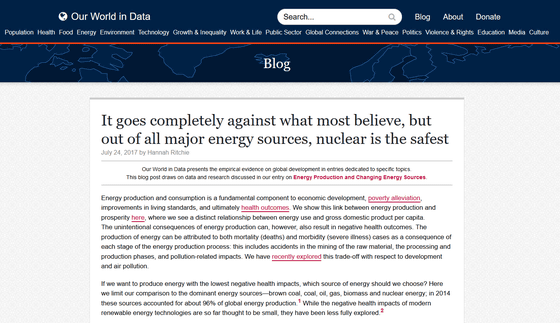The energy source with the least health impact will be "nuclear power generation"

ByTennessee Valley Authority
A site that visualizes data on how our living environment is changing "Our World In Data(OWID) ", based on various data, shows that nuclear power is the safest as an energy source.
It goes completely against what most believe, but out of all major energy sources, nuclear is the safest - Our World In Data
https://ourworldindata.org/what-is-the-safest-form-of-energy/

First of all, it is the mortality rate by accident related to energy production and air pollution when 1 TWh (Terahwatt hour) electric power generation (energy production) is performed using each energy source. 1 terawatt hours corresponds to the annual energy consumption of 12,200 American citizens. It is overwhelmingly high with brown coal 32.72, followed by coal 24.62, we know that the number of deaths related to air pollution will be very high. On the other hand, nuclear power is 0.07, which is estimated to be a cancer-related death due to the exposure to radiation.
A graph that predicts the number of people who are affected by energy production only with a specific energy source is kore. If all energy production is covered with brown coal alone, the number of deaths per year will be over 5 million people, but nuclear power is 11,766 people.
Although these two were due to short-term impacts, data are also shown on long-term perspectives in decades such as climate change. The horizontal axis of the graph below shows CO₂ emissions (gCO₂e / kWh) when producing energy 1 kilowatt-hour, and the vertical axis shows short-term mortality when producing energy of 1 terawatt hour. In OWID, these two correlations suggest that energy sources that adversely affect health when viewed in the short term adversely affect health on a long-term basis and that safe energy sources are considered safe in the future I point out.
However, concerning nuclear power generation, the impact of the Great East Japan Earthquake in 2011 caused the accident at TEPCO Fukushima Daiichi Nuclear Power Station, which raises questions about its safety. The following graph shows the percentage of people who expressed opinions of "strongly opposed" to "nuclear power" and "somewhat opposite", and less than half of India (38%) and the United States (48%), In the UK (51%), Japan (58%), China (58%), France (67%), over half, world average 62%, the opposite voice is over 60%.
Power is being put in energy production with renewable energy such as hydropower and wind power, but its proportion is still low.
"Fusion power generation technology" is expected also as "fusion", but time and cost to realization are unknown. Which energy source should human beings focus on in the future? There is also a possibility that the usable time is shorter than I expected ... ....
Can human beings put the ultimate energy source "fusion energy" into practical use? - GIGAZINE

Related Posts:
in Note, Posted by logc_nt







